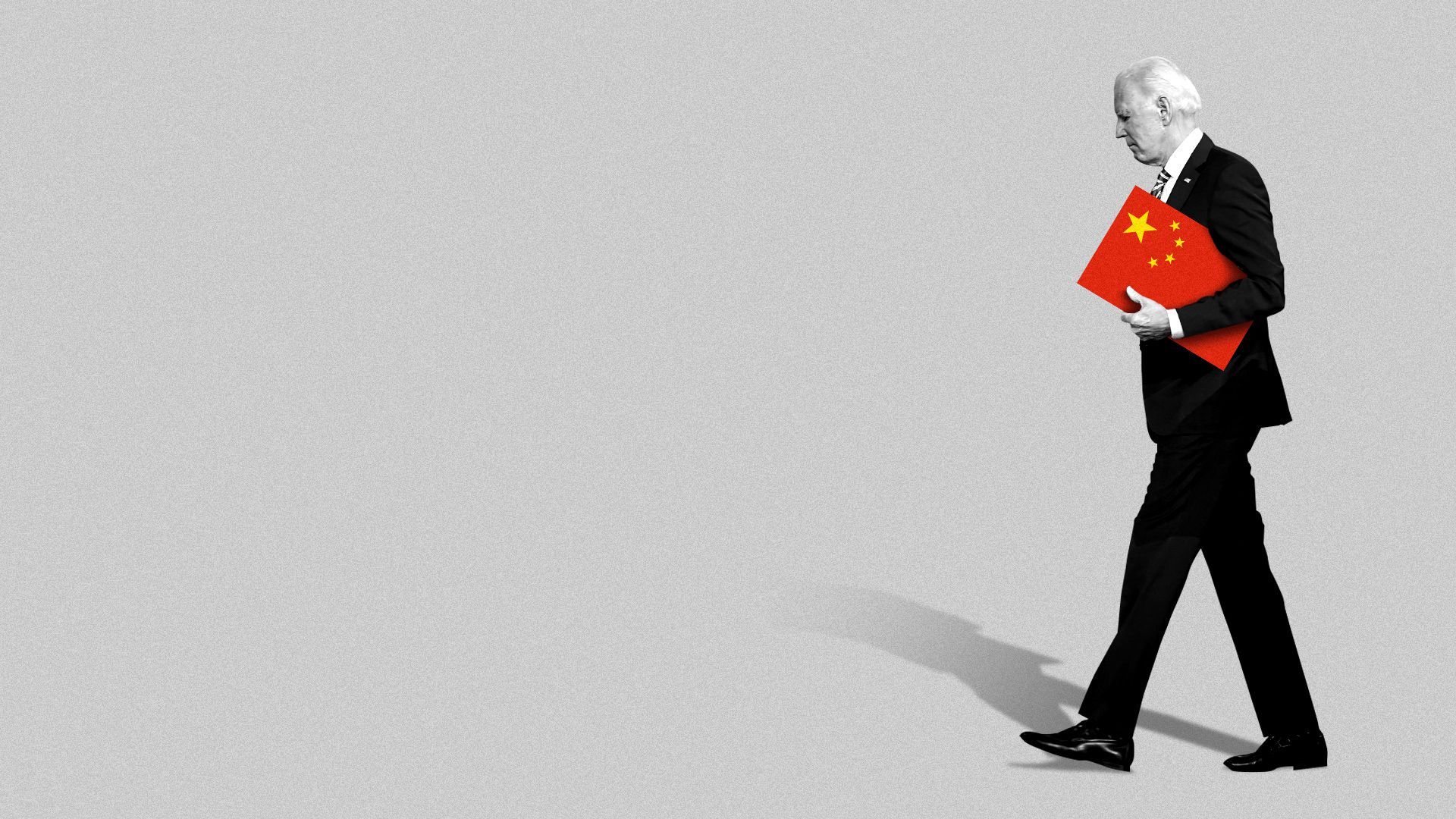Trump leaves Biden tough choices for his own China playbook
Add Axios as your preferred source to
see more of our stories on Google.

Photo illustration: Aïda Amer/Axios. Photo: Drew Angerer/Getty Images
President-elect Joe Biden isn't likely to pursue a full reset with China, but he quickly must decide which of the Trump administration's many policies to keep and which to scrap.
Why it matters: In a world struggling against the common threats of climate change, nuclear proliferation and an ongoing pandemic, the U.S. must find a way to both challenge and cooperate with a rising authoritarian superpower.
The Trump White House has pursued a "whole-of-government" approach to countering China's growing power, leaving Biden to preside over agencies that have implemented a dizzying number of China-related initiatives over the past four years.
- The U.S. Trade Representative's office has administered hundreds of billions of dollars in tariffs on Chinese imports.
- The Commerce Department has expanded the federal entities blacklist to include Chinese companies and government offices accused of complicity in human rights violations.
- The State Department closed the Chinese consulate in Houston, placed restrictions on Chinese journalists and media outlets in the U.S., and implemented visa restrictions for some Chinese students and scholars.
- The Justice Department's China Initiative led a huge increase in investigations into cases of economic espionage and research theft. They've also pursued investigations into science researchers for undisclosed links to China and prosecuted U.S. and foreign nationals for serving as unregistered foreign agents of China.
- The Education Department launched a major investigation into foreign funding at U.S. universities.
- The Department of Homeland Security placed greater emphasis on investigating supply chains for links to forced labor in China, and on stopping tainted shipments at the border.
- The Treasury Department imposed sanctions on government officials and entities in China and Hong Kong deemed complicit in human rights violations.
Between the lines: Though these policies are largely based on concerns that analysts on both sides of the aisle agree to be legitimate, critics accuse the Trump administration of harsh, clumsy implementation with little concern for collateral damage or disrupted lives.
What's next: As Biden decides what to do with each of these policies, he will face two major challenges.
The domestic challenge: Biden must address national security concerns without seeming to perpetuate the policies and rhetoric of the Trump era.
- This is a difficult needle to thread. Tough China policies are now so closely associated with Trump and his administration's racially charged overtones that the issue has become politically toxic for some Democrats.
- But Biden's top advisors agree China presents an enormous national security risk. “There’s a technology competition, a military competition, an economic competition, an ideological competition and a diplomatic competition,” Ely Ratner, a possible pick for a senior National Security Council position, told Axios before election night. “It’s a big task.”
The international challenge: President Biden has signaled he will embrace multilateral initiatives and work together with U.S. allies, a key strategy for blunting the effects of China's more aggressive moves and reshaping its behavior.
- But Trump's withdrawal from international commitments and open scorn for allies damaged trust in U.S. leadership, though it's not yet clear if that damage is permanent.
- Dented relationships could make it more difficult for the U.S. to get new potential initiatives off the ground, like a new multilateral body focused on tech standards, if foreign leaders are less willing to expend their own domestic capital for what might be perceived as a U.S. president's whims.
What to watch: Biden's cabinet picks will be especially crucial — and unlike with many foreign policy challenges in the past, it's not just the heads of the Defense and State Departments that will matter.
Go deeper: Biden's China plan: Bring allies
